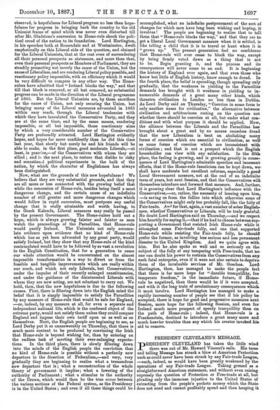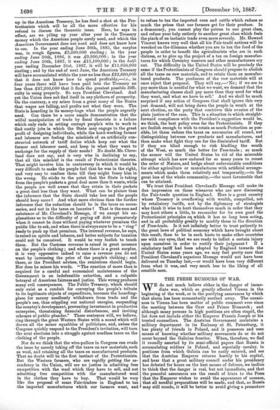PRESIDENT CLEVELAND'S MESSAGE.
PRESIDENT CLEVELAND has taken the little wind there was out of Mr. Howard Vincent's sails. His terse and telling Message has struck a blow at American Protection such as could never have been struck by any Fair-trade League, —such, indeed, as would have been greatly weakened by the operations of any Fair-trade League. Taking ground as a straightforward American statesman, and without even raising expressly the question of Protection or Free-trade at all, but pleading only the immense injustice to the United States of extracting from the people's pockets money which the State does not need and cannot profitably spend and then heaping it up in-the American Treasury, he has fired a shot at the Pro- tectionists which will be all the more effective for his refusal to discuss the theoretic issue. Here, he says in effect, are we piling up year after year in the Treasury /money which the American people sorely need, and which the American Government does not need and does not know how to use. In the year ending June 30th, 1885, the surplus was, in rough figures, £3,600,000 sterling ; in the year ending June 30th, 1886, it was £9,900,000; in the year ending June 30th, 1887, it was £11,100,000; in the half- year ending December 31st, 1887, it will be £11,050,000 sterling ; and by the end of next June, the American Treasury will have accumulated within the year no less than £22,600,000 that it does not know how to spend profitably,—i.e., in four years there will have been paid into the Treasury no less than £47,200,000 that it finds the greatest possible diffi- culty in using properly. So says President Cleveland. And yet the Union does not find itself in any plethora of prosperity. On the contrary, a cry arises from a great many of the States that wages are falling, and profits not what they were. The State is hoarding in its money-bags what the people urgently need. Can there be a more ample demonstration that the wilful manipulation of trade by fiscal theorists is a failure which only ends in setting corrupt people's wits to work to rind costly jobs in which the State may engage to the great profit of designing individuals, while the hard-working farmer and labourer are feeling the mischiefs of an artificially con- structed network of tariff duties which keep out what the farmer and labourer need, and keep in what they want to exchange for the supply of their needs? No doubt Mr. Cleve- land does not say, and is very wise in declining to say, that all this mischief is the result of Protectionist theories. That might involve him in controversy in which it would be sery difficult to make the people feel that-he was in the right, and very easy to confuse them till they might fancy him in the wrong. He sticks to the point that the State is taking from the people's pockets a great deal more than it wants, while the people are well aware that they retain in their pockets a great deal less than they want. What can be plainer than the inference that the State should take less and the people should keep more And what more obvious than the further iziference that the reduction should be in the taxes on neces- saries, and not in the taxes on luxuries ? That is the sum and substance of Mr. Cleveland's Message, if we except his ex- planations as to the difficulty of paying off debt prematurely when it cannot be done without paying whatever premium the public like to ask, and when there is always sure to be a " ring " ready to push up that premium. The internal revenue, he says, is raised on spirits and tobacco, and better subjects for taxation could not be conceived. It would be very foolish to tench .them. But the Customs revenue is raised in great measure -on the people's clothing ; and where there is a great surplus, it is very oppressive indeed to raise a revenue you do not want by increasing the price of the people's clothing ; and there, as the President advises, the remissions should begin. Nor does he mince his words. "The exaction of more than is sequired for a careful and economical maintenance of the -Government is an indefensible extortion, and a culpable betrayal of American fairness and justice. This wrong produces many evil consequences. The Public Treasury, which should only exist as a conduit for conveying the people's tribute to its legitimate objects of expenditure, becomes the hoarding- place' for for money needlessly withdrawn from trade and the people's use, thus crippling our national energies, suspending the country's development, preventing investment in productive enterprise, threatening financial disturbances, and inviting schemes of public plunder." These sentences will, we believe, ring through the great Western States with a sound which will drown all the minor squabbles of politicians, and, unless the Congress quickly respond to the President's invitation, will turn the next elections into a struggle against needless taxes on the 'clothing of the people.
Nor do we think that the wire-pullers in Congress can evade the issue by merely taking off the taxes on raw materials, such as wool, and retaining all the taxes on manufactured products. That no doubt will be the first instinct of the Protectionists. But the Western farmers, who are rapidly getting the as- cendency in the Union, will see no justice in admitting free competition with the wool which they have to sell, and not admitting free competition with the manufactured wool in the clothes they have to buy. That would be very like the proposal of some Pair-traders in England to tax the imported manufactures which our farmers want, and to refuse to tax the imported corn and cattle which reduce so much the prices that our farmers get for their produce. In a democracy, you cannot play the patron to one great class, and refuse your help entirely to another great class which feels the pinch of an inelastic trade even more severely. Mr. Howard Vincent knows very well that all his Fair-trade notions will be wrecked on the dilemma whether you are to tax the food of the people in order to benefit the agriculturists who are in such distress, or to give up the project of a tax on foreign manufac- tures for which Coventry weavers and other manufacturers cry out The difficulty in the United States will be precisely the same if the Protectionists of Congress should propose to abolish all the taxes on raw materials, and to retain them on manufac- tured products. The producers of the raw materials will at once reject that proposal. They will say,--'No ; if we are to pay more than is needful for what we want, we demand that the manufacturing classes shall pay more than they need for what they want, and what we have to sell.' And we shall be much surprised if any action of Congress that shall ignore this very just demand, will not bring down the people in wrath at the next election, on the party that contrives this evasion of the plain justice of the case. This is a situation in which straight- forward compliance with the President's suggestion would be, we think, the best policy even for the Protectionists. If they are foolish enough to wish to retain as much Protection as pos- sible, let them reduce the taxes on necessaries all round, not distinguishing between raw products and manufactures, and then make what fight they can for the diminished tariff. But if they are blind enough to risk kindling the wrath of the West, so much the better for Free-trade ; so much the sooner will the United States be rid of the miserable attempt which has now endured for so many years to recast the order of Nature, and hedge about unfavourable conditions for either agriculture or manufactures with artificial arrange- ments which make them relatively and temporarily,—to the great loss of the whole community,—the most favourable that can be attained.
We trust that President Cleveland's Message will make its due impression on those wiseacres who are now discussing the Fair-trade question in England. Here is a great country whose Treasury is overflowing with wealth, compelled, not by retaliatory tariffs, not by the diplomacy of strategists who think it wise to hurt themselves much in order that they may hurt others a little, to reconsider for its own good the Protectionist principles oil which it has so long been acting, and in all probability greatly to modify them in the direction of Free-trade. Is it not infinitely better to trust patiently to the great laws of political economy which have brought about this result, than to be in such haste to make other countries see with our eyes, that we are ready to inflict a certain injury upon ourselves in order to rectify their judgment I If a retaliatory tariff had been adopted by England towards the United States some years ago, we may feel pretty sure that President Cleveland's sagacious Message would not have been delivered on Tuesday last,—or would have been very different from what it was, and very much less to the liking of all sensible men.























































 Previous page
Previous page